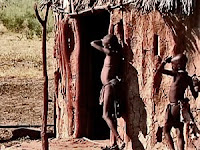 The Himba are a mostly nomadic pastoral people, breeding cattle and goats. They are an offshoot of the Herero people and speak a dialect of the Herero language.
The Himba are a mostly nomadic pastoral people, breeding cattle and goats. They are an offshoot of the Herero people and speak a dialect of the Herero language.Traditionally, women tend to handle more labor-intensive work than the men do. They carry water to the village, build the huts and care for the children. Men are responsible for maintaining relationships between clans and for tribal politics. Both men and women go topless and wear skirts or loincloths made of animal skins, but most famously, the women are known for covering themselves with otjize, a mixture of butterfat and ochre that gives their skins a reddish-orange tinge.
Our Adventure started with a drive north to the town of Opuwo, Namibia. Once there, and after several hours of searching, we meet the guide who would make our introductions to a Himba clan. At his request, we bought a large sack of rice to give the clan as a gift, then left town in our overland truck in the direction of the Angolan border.
It was a hot dusty drive along some very rough roads, but eventually we approached a collection of huts and shelters sitting unprotected in the afternoon sun. We had to wait in the truck while the driver and guide made their introductions and presented the sack of rice, but once they concluded the formalities, the clan allowed us to move freely around the village.
An impromptu Himba market
During the day, the adult men are with their animals, so only women and children were in the village. They gathered under one of the few trees in the area and began laying out handmade trinkets in hopes of making a sale. I made friends with a few of the boys by photographing them with my video camera and playing it back for them to watch. In the meantime, Denise was making friends by allowing the children to fix her hair. She ended up with ochre handprints all over the back of her shirt.
We remained with the clan for a few hours, but eventually returned to the truck, parched and in need of water. Luckily, our overland truck carries a few hundred liters, but when the women saw us filling bottles from the water tap, they decided they could save themselves the daily walk to the river. They came with their buckets and only said goodbye when they had drained the last of the water in the tank. It was another great experience and a true adventure in traveling.







No comments:
Post a Comment